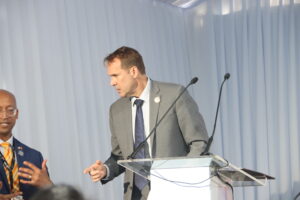Africa News 24 Pretoria Bureau
MUNICH, Germany – China’s foreign minister, Wang Yi, delivered a powerful message at the 61st Munich Security Conference, reiterating China’s commitment to an equal and orderly multipolar world in an era of growing geopolitical uncertainty.
“The world we live in is an increasing mix of turbulence and transformation,” Wang stated. “Many people are asking the same question: Where is it headed? If I may borrow the theme of this year’s Munich Security Report, it is headed toward multipolarization.”
Wang, also a member of the Political Bureau of the Communist Party of China (CPC) Central Committee, described multipolarity as both a historical inevitability and a current reality, citing the expansion of the United Nations from 51 members in 1945 to 193 today. He rejected the notion that multipolarity would lead to chaos and conflict, stressing instead that the world must strive for a just and stable global order.
“Will multipolarity bring chaos, conflict, and confrontation? Does it mean domination by major countries and the strong bullying the weak? China’s answer is, we should work for an equal and orderly multipolar world,” Wang declared. “This is another major proposition put forward by President Xi Jinping, and it represents our sincere expectation for a multipolar world. China will surely be a factor of certainty in this multipolar system and strive to be a steadfast constructive force in a changing world.”

China advocates equality among nations
Calling for an end to global power imbalances, Wang pointed to history as proof that unequal systems ultimately collapse. “Rivalry between big powers has brought disaster to humanity, as evidenced by the lessons of the two world wars in the not-so-distant past,” he warned. “Whether it is the colonial system or the core-periphery structure, unequal orders are bound to meet their demise.”
He indicated that all countries, big or small, strong or weak, should have equal rights, equal opportunities, and equal rules in the international system. “The Munich Security Conference has invited more participants from Global South countries in recent years. This is a wise thing to do,” he said. “Every country should have their voice heard. Every country should be able to find their place and play their role in a multipolar paradigm.”
Respecting international law
In a firm stance against unilateralism, Wang reiterated his country’s belief in the rule of law as the foundation of global governance. He invoked an old Chinese saying: “Circles and squares cannot be drawn without compasses and rulers.” Comparing the current global disorder to a “Pandora’s box,” he warned that ignoring legal norms leads to instability, where those at the table today may end up on the menu tomorrow.
He stressed that major powers should lead by example. “The multipolar paradigm must not be a state of disarray,” he said. “Without norms and standards, one may be at the table yesterday but end up on the menu tomorrow.”
China, Wang noted, has consistently upheld international agreements. “China is a member of almost all universal intergovernmental organisations and a party to over 600 international conventions. It never practices exceptionalism, still less cherry-picking,” he said. “I wish to emphasise that there should be no double standards in observing international law. Respect for all countries’ sovereignty and territorial integrity should mean support for China’s complete reunification.”
China promotes true multilateralism
Addressing the increasing bloc politics and confrontational alliances, Wang urged nations to strengthen, not dismantle, multilateral institutions like the United Nations. “This edifice has shielded all countries from wind and rain for nearly 80 years and is all the more needed in the multipolar world of the future,” he said. “We should cement its foundation rather than destroy its pillars.”
China, he noted, has acted on its multilateral commitments. “We have firmly upheld the authority and stature of the U.N. and contributed to more than 20 percent of the U.N. regular budget. We have acted earnestly on the Paris Agreement on climate change and built the world’s largest clean power generation system,” he noted. “We have also proposed and delivered on the Global Development Initiative, the Global Security Initiative, and the Global Civilisation Initiative, providing public goods for improving global governance.”
China encourages openness and win-win cooperation
Wang made a strong case against economic protectionism, warning that tariffs and decoupling strategies would backfire on the global economy. “Protectionism offers no way out, and arbitrary tariffs produce no winners. Decoupling deprives one of opportunities, and a ‘small yard with high fences’ only ends up constraining oneself,” he said.
Instead, Wang advocated for open cooperation and shared prosperity. He highlighted China’s economic contributions, stating: “An Australian scholar called China an ‘enabler,’ which I find very fitting. With a 5% GDP growth last year, China contributed to nearly 30% of the world’s economic growth.”

More from Africa News 24
China, Lesotho celebrate 30 years of friendship with tree planting exercise
Looking toward deeper China-EU cooperation, Wang noted: “China is willing to synergise high-quality Belt and Road cooperation with the European Union’s Global Gateway strategy, so as to empower each other and empower the entire world.”
A future of China-Europe partnership
Wang closed with a call for stronger ties between China and Europe, stressing that the two should view each other as partners, not rivals. “China has always seen in Europe an important pole in the multipolar world. The two sides are partners, not rivals,” he said.
With 2025 marking the 50th anniversary of China-EU diplomatic relations, he described the milestone as an opportunity to deepen strategic communication and mutually beneficial cooperation. “Taking this opportunity, China is willing to work with the European side to deepen strategic communication and mutually beneficial cooperation and steer the world to a bright future of peace, security, prosperity, and progress.”
His speech reinforced China’s commitment to stability, fairness, and global cooperation, positioning the nation as a leader in shaping a multipolar world that values inclusivity, economic openness, and rule-based governance.












